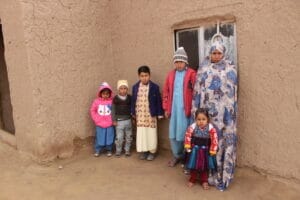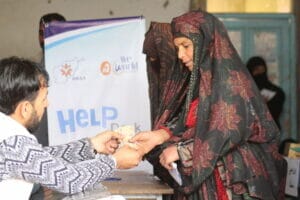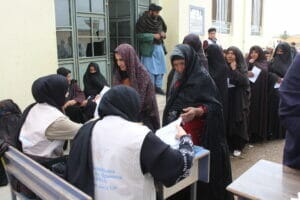
Recently, and especially since August 2021, most families in Afghanistan have been surviving in very harsh conditions, due to persistent droughts and unprecedent compounding crises. Numbers speak for themselves: from 2021, the people in need of humanitarian assistance have increased by more than 50% and they are estimated to be 28.3 million in 2023 – meaning more than 2/3 of the entire population. The country’s situation remains one of the most severe humanitarian crises worldwide, exacerbated by the alarming rates of human rights abuses.
The general political and economic setting has hindered access to basic services, worsened by the arrival of each winter, which represents a further challenge in terms of supplies. Moreover, such obstacles are more challenging in women-led households, where the recent restrictions have made the possibility of earning a living and to send their children to school a rarity: on top of the many difficulties that the country is going through, not being able to leave the house without a male relative, having many restrictions related to employment, and not being able to attend secondary school are seriously undermining the livelihood of women and on those who depend on them. This situation shows how basic human rights neglect has a direct effect on the survival of the communities.
As in every territory where we operate, in Afghanistan we support mainly women and children, who are always the most vulnerable in the light of crises and whose rights have been neglected. This year, we have been supporting 420 women-led households with two cash assistance projects in the north of the province of Herat. The struggles of the families we support are hard to imagine: they are affected by poverty, restrictions and the consequences of harsh weather, often combined with health issues and needs that are rarely met
The stories of our beneficiaries
"I am alone with 8 children and I shouldered the burdens of poverty and helplessness" says Firuzah, a 40-year-old woman who was selected as a beneficiary of our programme. She lives with her children in a single room in the village of Chahar Dara Yeka Darakhat and has no land to farm. His 13-year-old son has a mental disorder, and she doesn’t have any other relatives to support her. When she was 13, she was forcibly married by her family to a much older man, who died three years ago after a long disease. She has a heart condition and other health problems which she is unable to address adequately.
Before receiving cash assistance, the family had very little to eat and relied on charity from the neighbors and on some sporadic daily jobs Firuzah would get on the neighbors’ agricultural lands. However, less and less people are able to be charitable or even to pay daily workers, making many families’ livelihood even more vulnerable.
One of Firuzah’s daughters recently had an accident with the stove and her mother was able to take her to see a doctor. This shows that having an 8-month assistance is a true relief for the family, who are now less impacted by unexpected situations. Moreover, they are no longer afraid of hunger and they can wear warm clothes during winter.
Eidi Gol, a 45-year-old woman who is another beneficiary of our programme, told our local staff:
“My daughter and son, who are healthy, were patient when they were hungry, but my two other children, who are physically disabled, would get impatient. They would cry and scream and I had to borrow bread from the neighbors. But now my children have enough food to eat and I can take them to the doctor when they are sick. This assistance is making me and my children go to sleep at night without thinking about what to eat the next morning.”
Eidi Gol lives with her children in a shared house with other relatives, where the structural conditions are very precarious due to heavy water infiltrations. Three years ago, her husband left for Iran to find an opportunity to earn a better living, and they have not heard from him since. Eidi Gol’s elder children help her around as they can, fetching water for the family, sharing part of their meals and carrying around their disabled brothers. With the low temperatures approaching, the assistance allows the mother to buy clothes and coal to stay warm.
With our intervention in Afghanistan, we stand alongside the most vulnerable communities and we continue to work to ensure the most basic human rights can be respected and guaranteed.
Thanks to the precious work of our Afghan female staff for collecting these stories, as well as others.



